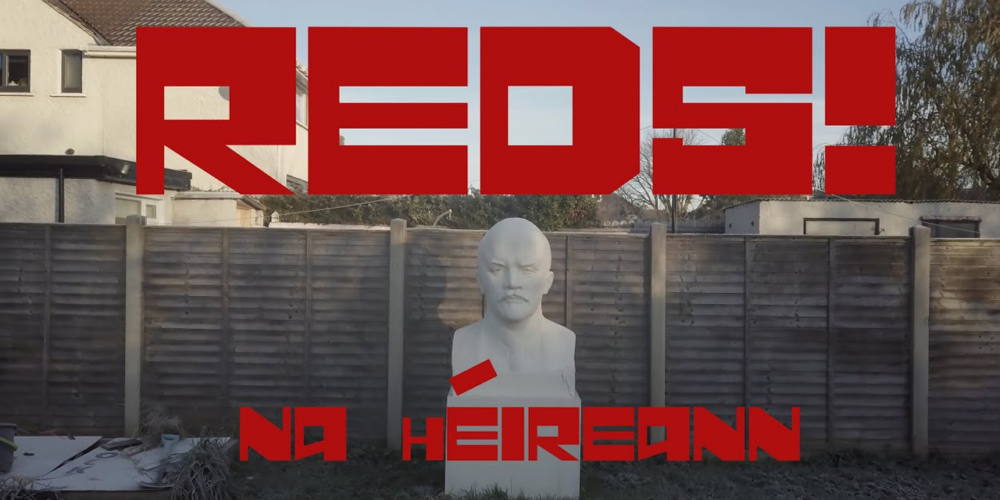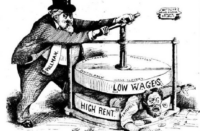The documentary Reds na hÉireann (dir. Kevin Brannigan, 2023), shown on TG4 on 24th May 2023, probably served as a bit of an eye-opener for many people whose ideas of communism and communists have been shaped by a century of relentless, hostile propaganda from the apologists and defenders of capitalism – whether in politics, the press or the pulpit. Communists, we were told, are indoctrinated, brainwashed by an alien ideology, incapable of independent thought.
What a surprise then, to see and hear people who had been involved in the communist movement in this country, some for many years, talking of their experiences and of how and why they became involved. They joined up precisely because they were critical thinkers who didn’t blindly accept the prevailing norms of a society built on exploitation and inequality. The filmmakers are to be complimented on a very interesting, engaging and even-handed documentary.
Wherever they have finished up, all those interviewed shared at one time that vision of a better, more just and equal world, free of war, famine, racism and misogyny. After “the fall” many ceased to believe, not in those values, but in the viability of the Communist movement as a means to achieve them. Disillusionment and demoralisation led some out of politics altogether, while others sought refuge in the clammy embrace of social democracy, and the fantasy that a better world can become a reality without struggle, without challenging and defeating the power of capital and imperialism.
In this regard it is worth noting that of the ten speakers acknowledged in the end credits of the film, only two are still members of the Party, namely Sean Edwards and Eugene McCartan. There are a lot more of us than that! In fairness, most of the others spoke of why they became involved and that remains valid, whatever their subsequent political destination. With the exception of Fergus Whelan, none of them attacked the Party.
Fergus was a rather odd choice in that, although he was a CYM member for a few years as a teenager, he never joined the Party, in either its Irish Workers Party, or later CPI, form, so perhaps he is not best placed to pontificate on it. In the interests of glasnost, or openness, it would perhaps have given context to Fergus’ critical remarks if viewers knew he was a member of Official Sinn Féin/Sinn Féin the Workers Party/Workers Party and an acolyte of that well known “revolutionary” Eoghan Harris, the ideological guru of the Workers Party who then turned advisor to Fine Gael, and finally advisor to the Unionist Party!
Another strange inclusion was the so-called “Communist Party of Ireland Marxist-Leninist”. This was the Irish pygmy variant of an international phenomenon in the 60s and early 70s of would-be “super Stalinists”, who misappropriated the term “Marxist-Leninist” and were set up and supported by Maoist China to disrupt and undermine the world communist movement. The Irish version came out of an outfit called the Internationalists in Trinity College, who paraded around Dublin like an evangelical sect, brandishing and chanting slogans from Chairman Mao’s “little red book”, to the great bemusement and occasional amusement of the amazed populace. The CPI-ML had nothing to do with our Party. Standing the besuited posh boy David Vipond in a bye-election in largely rural Monaghan under the catchy slogan “Down with the three major bourgeois parties, Fianna Fáil, Fine Gael and Labour” gives a fairly clear idea of their grasp on reality.
Whether under the banner of the Irish Workers Party, CPNI or, since 1970 the CPI, Communists in Ireland, and the youth activists in the CYM or Communist Youth League, have always sought to stand by and champion the interests of all working people, North and South, “Catholic, Protestant or Dissenter”. The archive film clips in the programme showed CYL activists in Belfast engaged in anti-war and anti-racist demonstrations in the 1960’s, and CYM activists in Dublin being organised by Gerry Fleming and Mick O’Reilly, both subsequently major trade union figures. They were exciting times for young socialists and communists who believed the path to revolution lay in organising and fighting for rights, rather than sticking flowers in our hair, getting stoned and turning our backs on society.
There has been no major struggle in this past century that Irish communists were not involved in. The range of struggles and campaigns the Party has been involved in was immense; in fact we played a leading role on some issues, whether it was fighting against unemployment and emigration in the 1950s, civil rights in the North in the ‘60s and ‘70s, the Dublin Housing Action Committee, solidarity with Vietnam and Cuba, the anti-apartheid movement, and other key struggles.
We opposed the Provos’ military campaign as divisive and counterposed to it a strategy of mobilising around demands for a Bill of Rights, a British Declaration of Intent to Withdraw, fighting in the trade union movement for these demands and for the unity of the class. We were centrally involved in the establishment in the early 1980s of “Trade Unionists for Irish Unity and Independence”, which sought to win the trade union movement in Ireland and Britain for an end to repression in the North and for a British Declaration of Intent. Communists were to the fore in organising the “Back to Work” campaign in Belfast in the face of massive intimidation from Loyalist paramilitaries. Opposition to joining the Common Market/EEC/EC/EU and the various ensuing treaties such as Lisbon which have further diminished our sovereignty and undermined Irish independence was and remains a central plank in our programme, now more urgent than ever with the increasing militarisation of the EU.
Through all of this common themes run, as was clear from Reds na hÉireann: the sense of being part of a mighty, world-wide movement for peace, independence and socialism, the shared belief that another world is not only possible, but necessary. Another thing which clearly emerged was that people didn’t join because of what was happening in the Soviet Union. In fact, most of us knew little or nothing about the USSR until after we became involved!
Above all else it was the discovery of James Connolly which attracted many of us in the 1960s and continues to do so. The true character of Connolly had been almost a well-kept secret of modern Irish history. The most deep thinking and articulate of the leaders of 1916 and the greatest leader the Irish working class has ever produced (and, like Jim Larkin, an immigrant to boot!) entered into our consciousness around the time of the 50th anniversary of the 1916 Rising. A new way of looking at our country and its history amazed us. Connolly himself describes Marxism as “the key to history” and his extensive writings still powerfully fulfil that function. Whose view of Irish history can remain unchanged after reading Labour in Irish History? Whose view of the role of religion has not been influenced by Labour, Nationality and Religion? Who has not been impressed by the challenge Connolly puts before us in The Reconquest of Ireland?
We did not join up because of the Soviet Union: although it provided a bulwark against imperialism for 80 years and gave us a glimpse of a world that could be, it was not the initial impulse. So when the red flag came down over the Kremlin, our small Party defiantly hung the red flag from our headquarters in Connolly House.
It was and is the reality of Irish life: the poverty, homelessness, sexism and misogyny, crumbling health and social security systems in the midst of vast wealth, the scourge of drug abuse and its effect of working class communities, the establishment parties beating the drums of war to drag us into NATO’s orbit, the entrenched sectarianism of so called “solutions” in the North, the terrifying rise of the Right, internationally and at home. Although much has changed over the 50-60 years which Reds na hÉireann addressed, the struggle continues. The idealism, optimism, hope and determination which initially led many of us into left wing politics needs to be generated and harnessed anew. Capitalism with its wars, poverty and many injustices cannot provide solutions; in fact it is the fundamental cause. Join us in the struggle to put an end to its horrors.
OUR FLAG STAYS RED!






